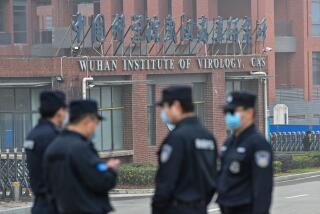AIDS-Like Mystery Virus Isolated by UCI Scientists : Health: Team has found it in nine patients who have symptoms of the disease but test negative for HIV.
- Share via
IRVINE — A team of UC Irvine scientists has isolated a previously unknown virus in nine people who had an AIDS-like disease but tested negative for the two viruses known to cause AIDS.
The new virus was first discovered in a 66-year-old Southern California woman who had a type of pneumonia common to AIDS patients but other than a blood transfusion 40 years ago, had no known risk factors for AIDS, UCI researchers announced Wednesday.
The virus has since been found in the woman’s 38-year-old daughter, who has no symptoms of the disease, and in blood samples from eight other patients with AIDS symptoms but no evidence of exposure to the human immunodeficiency viruses (HIV-1 and HIV-2) that cause AIDS.
“At this point it would be premature to say that this virus is the cause of these AIDS-like symptoms,” said Dr. Sudhir Gupta, an immunologist heading the UCI team. “But we can say that there is a strong association between this virus and those cases of HIV-negative AIDS.”
The virus, which has been named human intracisternal retrovirus (HICRV), could be a new virus or an old one that has gone undetected in humans until now, Gupta said. But it is certain to be examined further for a link to more than two dozen AIDS mystery cases that have baffled researchers and public health experts.
Scientists gathered this week at the eighth International Conference on AIDS in Amsterdam have been debating the emergence of a possible new virus that could account for the mystery cases in which patients have what outwardly appears to be acquired immune deficiency syndrome, yet test negative for HIV-1 and HIV-2. They called on clinicians around the world to come forward with additional information on the baffling cases.
Gupta responded by releasing a scientific paper on the new virus that is scheduled to appear in the Aug. 15 issue of the Proceedings of the National Academy of Sciences. At least three of the blood samples Gupta has tested for the newfound virus are among the cases being discussed at the Amsterdam conference.
At the international AIDS meeting, scientists reacted with caution to the release of Gupta’s work.
“It is very important for investigators who have these cases to get together and make sure the results can be confirmed,” said Dr. Anthony Fauci, director of AIDS research for the National Institutes of Health. “On the basis of a single paper, I don’t think we can say: ‘We have it.’ That would be premature.
“This is obviously something we need to pay serious attention to,” Fauci added. “It would be essential for there to be cross confirmation of results . . . before any definitive conclusions are made.”
Dr. David Ho, director of the Aaron Diamond AIDS Research Center at New York University, has been studying 11 other patients with an AIDS-like disease in New York and Los Angeles who have tested negative for HIV-1 and HIV-2. Ho, who said he also has discovered evidence of another retrovirus in several of these cases, said he has found a “high magnitude” of reverse transcriptase--an enzyme essential to the replication of retroviruses--which is a sign that a retrovirus is present. He said it is not the type of reverse transcriptase associated with HIV-1 or HIV-2.
Nevertheless, he said--speaking of his own work--that he felt it was too early to declare a new retrovirus had been found until other viruses or possible laboratory contaminants had been ruled out.
The newly discovered virus is almost certainly not a mutant form of HIV-1 or HIV-2, Gupta said.
“Its structure is very, very different from the AIDS virus,” he said. “And it seems to reproduce differently.”
It remains unclear, though, how this newly discovered virus is transmitted.
Gupta’s patient, a 66-year-old Anglo woman from Southern California, had a blood transfusion 40 years ago, but has no other risk factors for AIDS that could explain her classic symptoms of AIDS, including Pneumocystis carinii pneumonia and a deficiency in T-cells, white blood cells that are vital to the body’s immune system.
The daughter, who like her mother has antibodies to the newly discovered virus, has no clinical symptoms associated with AIDS. But Gupta said there is some evidence that her T-cells are not working properly.
Pregnant women infected with HIV pass on the virus to their babies in about a third of the cases. But asked how his patient’s daughter may have contracted the mystery virus, Gupta said, “At this stage, your guess is as good as mine.”
The eight other blood samples provided to UCI--three from the Centers for Disease Control and five from other laboratory sources--belonged to patients who were gay or had blood transfusions, Gupta said. The majority of those people already have died of what appeared to be AIDS.
Gupta said there is no need to fear for the safety of the nation’s blood supplies, which are widely tested for evidence of HIV.
“The blood supply can never been 100% safe, but people should not be overly concerned,” Gupta said, adding that there are still relatively few of these HIV-negative cases.
Still, mindful of the number of people who developed AIDS after receiving transfusions of tainted blood in the early 1980s, Gupta said he and fellow researchers are working to develop a test for the new virus.
In Amsterdam, Dr. Myron Essex of the Harvard AIDS Institute said, of Gupta’s paper, “I’m not overwhelmed by it.” He added that intracisternal particles “have been around for a long time. A lot of reverse transcriptase activity involving intracisternal particles have been described in human tissues for the last 20 years, since the late ‘60s.”
“He (Gupta) has not established there is a new human retrovirus,” Essex added. “I think the term virus is used very loosely.”
Even Gupta cautioned that the public, or people in high-risk groups who have tested negative for HIV, should not be worried about the findings.
“At this stage, I would say people should not be alarmed because we don’t know how it is transmitted and there are a very limited number of cases,” he said. “But as data comes in, we may have to revise that.”
Dr. June Osborn, a virologist who heads the National Commission on AIDS, said at the AIDS conference that she feared the public “could be unduly frightened by a very preliminary report” and urged: “We have to let science work, and people need to know that it is working diligently.”
Lindgren reported from Irvine and Cimons from Amsterdam.
AIDS CLUE INDICATED: Long-surviving AIDS patients could help others. A6






